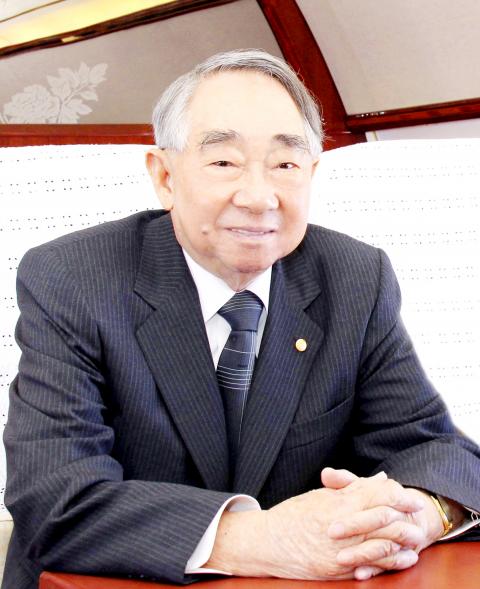Chang Yung-fa (張榮發), the billionaire founder of Evergreen Group (長榮集團) who turned a second-hand bulk carrier into Asia’s biggest container-shipping line, died yesterday. He was 88.
He died at 11:05am, Evergreen Group said in an e-mail. No cause was given.
Chang, the son of a seaman, started building his business almost five decades ago by buying a used bulk vessel and became one of the nation’s richest people. He was chairman of Taipei-based Evergreen Group, which owns Asia’s largest container fleet through Evergreen Marine Corp (長榮海運); EVA Airways Corp (長榮航空), the nation’s largest airline by market value; Evergreen Sky Catering Corp (長榮空廚), an airline-catering company; and hotel chain Evergreen International Hotels (長榮桂冠酒店).

Photo: EPA
Chang has a fortune of at least US$1 billion, according to the Bloomberg Billionaires Index.
“The oceans and ships occupy very important places in my life,” Chang wrote in his autobiography, published in 1997.
The tycoon called himself “a natural-born son of the ocean.”
Evergreen Marine, the company that began his business empire, was established in 1968 with the used bulk vessel.
It expanded into an operator of more than 190 ships, according to information from shipping-data provider Alphaliner.
The company posted a net loss of NT$2.41 billion (US$71.25 million at current exchange rates) in the quarter ended September last year, after posting a profit a year earlier, as the global economic slowdown hurt the shipping industry.
Chang was also an advocate of closer economic relations with and China. In 2008, Taiwanese and Chinese airlines, including EVA Airways, began regular flights across the Taiwan Strait after the lifting of a six-decade ban on direct transport links.
His personal holdings as of Dec. 31 last year included 6 percent of publicly traded Evergreen Marine and 2.9 percent of EVA Airways, the nation’s largest airline by market value, according to data compiled by Bloomberg.
His youngest son, Chang Kuo-wei (張國煒), is chairman of EVA Airways.
Evergreen Group is the benefactor of non-profit organizations such as a maritime museum and a symphony orchestra.
Born on Oct. 6, 1927, in the northeastern coastal township of Suao (蘇澳), Chang was the third of seven children. He started working as a clerk for a Japanese shipping company as a teenager while attending night school and went on to spend 15 years as a sailor, rising to the rank of captain.
Chang became the family’s breadwinner when his father died in 1944, as his two elder brothers had married by then, according to his book.
He was married in 1953, and had four sons and a daughter.
In 1989, his son Chang Kuo-ming (張國明) was kidnapped for a US$1.9 million ransom.
The younger Chang was eventually released unharmed, while his three kidnappers were apprehended and executed the following year, The Associated Press reported at the time.

DAREDEVIL: Honnold said it had always been a dream of his to climb Taipei 101, while a Netflix producer said the skyscraper was ‘a real icon of this country’ US climber Alex Honnold yesterday took on Taiwan’s tallest building, becoming the first person to scale Taipei 101 without a rope, harness or safety net. Hundreds of spectators gathered at the base of the 101-story skyscraper to watch Honnold, 40, embark on his daredevil feat, which was also broadcast live on Netflix. Dressed in a red T-shirt and yellow custom-made climbing shoes, Honnold swiftly moved up the southeast face of the glass and steel building. At one point, he stepped onto a platform midway up to wave down at fans and onlookers who were taking photos. People watching from inside

MAKING WAVES: China’s maritime militia could become a nontraditional threat in war, clogging up shipping lanes to prevent US or Japanese intervention, a report said About 1,900 Chinese ships flying flags of convenience and fishing vessels that participated in China’s military exercises around Taiwan last month and in January last year have been listed for monitoring, Coast Guard Administration (CGA) Deputy Director-General Hsieh Ching-chin (謝慶欽) said yesterday. Following amendments to the Commercial Port Act (商港法) and the Law of Ships (船舶法) last month, the CGA can designate possible berthing areas or deny ports of call for vessels suspected of loitering around areas where undersea cables can be accessed, Oceans Affairs Council Minister Kuan Bi-ling (管碧玲) said. The list of suspected ships, originally 300, had risen to about

A Vietnamese migrant worker yesterday won NT$12 million (US$379,627) on a Lunar New Year scratch card in Kaohsiung as part of Taiwan Lottery Co’s (台灣彩券) “NT$12 Million Grand Fortune” (1200萬大吉利) game. The man was the first top-prize winner of the new game launched on Jan. 6 to mark the Lunar New Year. Three Vietnamese migrant workers visited a Taiwan Lottery shop on Xinyue Street in Kaohsiung’s Gangshan District (崗山), a store representative said. The player bought multiple tickets and, after winning nothing, held the final lottery ticket in one hand and rubbed the store’s statue of the Maitreya Buddha’s belly with the other,

Japan’s strategic alliance with the US would collapse if Tokyo were to turn away from a conflict in Taiwan, Japanese Prime Minister Sanae Takaichi said yesterday, but distanced herself from previous comments that suggested a possible military response in such an event. Takaichi expressed her latest views on a nationally broadcast TV program late on Monday, where an opposition party leader criticized her for igniting tensions with China with the earlier remarks. Ties between Japan and China have sunk to the worst level in years after Takaichi said in November that a hypothetical Chinese attack on Taiwan could bring about a Japanese